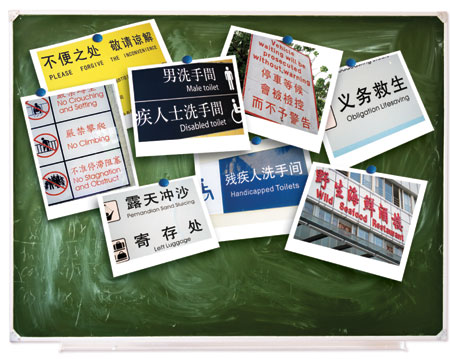Such language!
Updated: 2012-10-26 07:03
By SL Luo(HK Edition)
|
|||||||

|
Dr Jose Lai calls for more professional training for students to help them lift their standard of English and for experts to put their heads together to do it. SL Luo / China Daily |
Hong Kong prides itself on being a world city, but the general standard of English in government, schools, as well as public and private organizations, threatens to erode that image. What has gone wrong and who's responsible? Are we going to allow future generations to grow up with gibberish, incomprehensible 'Chinglish'? SL Luo reports.
Learning or mastering any language or dialect is much more than an art. It requires flair and instinct, plus the will and determination to make the grade.
Linguistics experts and academics concur.
I've learned English the hard way. I can remember when I was in primary school in my home country, my English-class teacher - a burly, no-nonsense Texan - would come around each morning armed with a metal ruler and deliver a ruthless strike on the back of my palm every time I made an inexcusable grammatical error.
I would scream in excruciating pain from the punishment exacted for my incorrect usage of the words, "comprising" and "including." There were no laws or rules governing what's deemed to be "justified cruelty" to pupils, nor were there any channels or avenues for complaint at the time. I just had to endure it!
As we were under the British before we won independence, the medium of instruction then, in government, educational institutions and public and private establishments, was English. The language was of prime importance.
In Hong Kong, Cantonese remained the dominant dialect until some two decades ago, when greater emphasis was placed on English, as the city geared itself up to play a pivotal role in global affairs, business and commerce.
The general standard of English in Hong Kong today, however, is still mired in acrimonious debate, with linguistics experts and critics being almost unanimous in their concurrence that the standard has fallen back, while the authorities are on the other side of the fence, adamant that it has improved substantially overall, over the years.
Former Chief Executive, Donald Tsang Yam-kuen, led the defense in 2011, saying both English and Chinese were of equal status and enjoyed "equality of use" in communications between the government and the public.
"Thus, we cannot blame what we may perceive as declining English standards in Hong Kong on a lack of a clear English policy," he argued.
Language experts state their grounds, for what they call the "sorry state of affairs" in Hong Kong, with regard to the use of English either in official or private usage.
Who is right and who is wrong? What are the root causes of the problem and why? Are those people in charge being careless, nave, irresponsible or totally incompetent? Are the critics justified in their verbal onslaught?
Some of the answers, perhaps, can be found among the web of rather ambiguous traffic signboards and notices put up across the city (and also in the region) by government concerns or private organizations.
Reading them can be amusing and entertaining, but trying to comprehend them could be a headache. Just to name a few - "Disabled Toilet," "Waiting Vehicles To Be Prosecuted Without Warning," "Please Forgive The Inconvenience," "No Stagnation and Obstruct," "Sloppy Dress, Not Received," "Obligation Lifesaving" and "Wild Seafood Restaurant."
Listening to the broadcasts while taking a train ride from Hung Hom to Lo Wu, or the other way round, is equally entertaining. "If you are carrying luggage on the MTR, please ensure it's within the permitted ......," says one regular announcement. The last word in the broadcast, read in petty roadside "Chinglish," is hardly audible - it sounds like "measurements" or "nationalists" at the same time.
Another announcement flashed on the carriages' electronic panels smacks of kindergarten language. "This train is going to Hung Hom" instead of simply saying in succinct, grammatical English: "This train, or service, terminates at Hung Hom."
We took the courtesy of alerting the Mass Transit Railway Corporation (MTRC) two days before the publication of this article, and promised that any response would be welcome and incorporated into the story.
They responded with an eleventh-hour email, received by China Daily just hours before press time. The reply, signed by the MTRC's Media Relations Manager, rallied to the company's defense. "The English is aimed to be accurate, simple, clear and concise so that it is easily understood by both native and non-native users of English. Notices are designed so that their messages can be easily grasped by people walking by them. All the language and terminology used in passenger information are drafted by an in-house native Engish speaker who makes reference to English terms used in the international travel industry," it said.
China Daily asked linguistics experts and academics for their views and suggestions on how to remedy the situation and what they thought is really impeding Hong Kong people from lifting their standard of written and spoken English.
Dr Jose Lai, Director of the English Language Teaching Unit at the Chinese University of Hong Kong, while acknowledging that Hong Kong has not been up to the mark with English, ruled herself out as a hawk on this issue.
Citing historical and social factors for the phenomenon, she admits that English is not easy to learn, let alone mastering it.
"The English language is also to blame too. It's too complicated in both its spoken and written modes. Then there are the formalities. The English language system is sophisticated. People need to be introduced to it properly and intelligently," she says.
Then, there's Hong Kong's historical and deep-rooted Chinese culture with the Cantonese dialect having sunk into the local way of life, thus hindering the extent to which English can be used.
"Cantonese is in the blood of Hong Kong Chinese. Many are reluctant to use English in day-to-day conversations, especially when they're communicating with locals, because they feel others may sneer at them with the impression that they are just 'showing off,"' says Lai.
"Also, the linguistics environment in Hong Kong is not as favorable as we wish it to be. You see local people talking in the street - if there's an option to use English or Chinese, they would certainly use Chinese, which is their mother tongue.
"Hong Kong too is a very big society. Of course, there are people, including people who have a good standard of English. But, there are others who are still struggling. Generally, there's a trend that English is slipping away."
Lai gave another classic example of gibberish English being used here, adding to the tally brought up by China Daily. "Sometimes, if you walk into, say, a clinic. A sign hung on the door reads, "Opened." This is something laughable. The language awareness is not high enough."
So, what's the solution?
In Lai's view, a lot of people would like to speak good English, because in Hong Kong and China, the need for proper use of the English language is on the rise. But, she thinks, they are not prepared for it.
"Language experts and educators have to put their heads together to seek a constructive way for the younger generation to learn English. We need more professional training for them.
"We must approach the issue in a more positive way. I've been giving a lot of encouragement to my students to ensure they do it the right way. We need to help them to get along and teach them how to 'fish'. Role models can thus be created at big companies and organizations," Lai adds.
Hong Kong also has several prestigious international language schools and facilities for those eager to acquire the skills they need, to help them climb up the academic and corporate ladders. But, it seems the exorbitant fees demanded, are putting potential students off, cushioning the crucial role those schools are supposed to play in the academic and social arena.
Another linguistics expert, who preferred anonymity, took a more hawkish stance, declaring that we must not let the standard of English to rot or degenerate, or any other language for that matter, or else Hong Kong would go down the drain.
"Hong Kong has to maintain and live up to its reputation as an international city and strengthen its competitive edge globally," he said.
He agreed that picking up any language requires the will and courage to succeed. "The thing is you must have a very strong foundation, just like when erecting a building, or else it will collapse. The same logic applies to learning a language or dialect. One has to start from zero and go all the way up."
He reckons that skilful use of any language is not necessarily inborn or that it's sure to go well with a native speaker. "Being able to speak, and master a language or dialect are two entirely different things. The same goes with oral and written English."
The remark brings me back to a stunning experience I had had with a woman expatriate journalist in Hong Kong years ago.
I asked her what's the difference between a TOY factory and a TOYS factory? Her reply: "A toy factory is one that makes one toy while a toys factory makes more than one."
It shocked me to the bone.
The proliferation of other forms of "localized English" spoken by nationals of various countries in Hong Kong is another drawback in the push to drive English standards to a higher level.
I asked a Singaporean resident in Hong Kong what he thought of the form of English so widely spoken in his home country, compared with Hong Kong's, and whether it would help Hong Kong people in the long run.
He replied in classic "Singlish": "We have our own culture lah! It's been with us for generations. We are used to it, you know. Come on, man, it's very hard to force yourself to change and speak in a way you're not used to."
Naturally, not every Singaporean speaks the way the majority of them do. Certainly, not their nation's founding father, Lee Kuan Yew, a gifted orator widely recognized for his superb command of the English language.
The subtle Lee once remarked: "In any language, nobody, however good with it, can be one step ahead of his or her own mother tongue. I had noticed that one of our officials, when she was reading the script in English, she looked down. But when she was reading it in Chinese, she looked up."
Hong Kong may still have a long way to go in pushing up the standard of English to the level it needs and deserves as a world city, and to stay ahead on the global stage.
The author of this article would like to emphasize that this article is not intended to be malicious, nor is it meant to ridicule or degrade any individual or party. The message is: Are we going to allow future generations, our children, to grow up with gibberish English and let them get away with "Chinglish" "Singlish" or "Japlish"?
(HK Edition 10/26/2012 page4)
